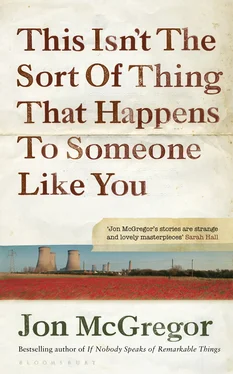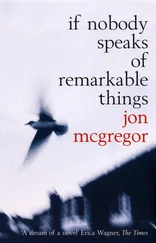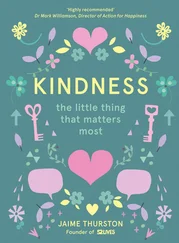‘What do you think she means?’ Catherine asked. ‘ See you again soon ?’
‘Oh, I’m sure it’s nothing. Just a figure of speech.’
‘Really?’
‘Really.’ He straightened the napkin on his lap, and fiddled with his knife and fork. ‘Crisis over,’ he said. He poured out two glasses of water. ‘Did she take anything?’
‘No. I looked, but I don’t think anything’s missing.’
‘Did she say anything when she left, besides the note?’
‘No, nothing.’
They shut their eyes and said a prayer of thanks and cut open their potatoes, the steam rushing out into the room and filling the space between them for a moment while they each waited for the other to reach for the butter and the salt.
‘Well,’ he said. He was almost smiling. He felt vindicated, she supposed. ‘I imagine that’s that then.’
‘Yes,’ she said. ‘I imagine you do.’
Stickford
It’s not really something he likes talking about, to be fair. It is, in actual fact, quite a difficult thing to discuss. But it’s becoming more of an issue. It’s having knock-on effects. What it is, he has this fear of breaking open eggs. It’s a type of phobia. There doesn’t seem to be a Latin name for it. He’s checked. But essentially he has this fear that he’ll one day break open an egg and find a little baby chicken foetus curled up inside. Dead. Occasionally he imagines it being just about alive — limply flopping is the phrase which comes to mind — but he’s pretty sure that’s just him being irrational.
He is in actual fact quite sure the whole thing’s irrational but he can’t get the idea out of his head. He knows something about poultry-farming methods; he’s been looking into it, and he knows that the chances of a fertilised and developed egg making its way into the retail chain are just about impossible. For starters if it was an egg from a battery-cage site then it stands to reason it wouldn’t be fertilised. Due to the cages, that would be. And even on the organic or free-range sites they do have these incredibly strict inspection regimes. It would be a failure of what he’s been reliably informed are very robust systems. Millions and millions of eggs are produced every single day.
It would only take one.
It started when he overheard a man in a café describing it actually happening to him. The man was the owner of the café. He was talking to a woman at the counter who was ordering breakfast. He told her that some years previously, when he was working in the kitchen, he’d broken an egg and found a baby chicken inside. He described it in quite some detail, was the thing: how perfectly formed the foetus had been, with feathers and everything, how there was mostly blood and membrane where the yolk should have been. He told the woman it had quite shaken him up and he’d been unable to cook with eggs from then on. The woman changed her mind about what she was ordering. It’s a conversation he can remember very clearly. There were certain shapes the man made with his hands while he was describing it all.
But when he knew it had got really bad was this one time when he was staying with his wife at a B&B. It was out in the country somewhere and the landlady kept chickens in the garden. His wife had liked that. She’d thought it was very authentic. Only he’d noticed that there was a rooster in with the hens, and then at breakfast he’d found these dark-red specks in the yolks of their fried eggs. Tiny specks, to be fair, about the size of a pencil mark made with a very sharp pencil. But he’d understood what they were. And the trouble was, he hadn’t wanted to say anything to his wife, and he hadn’t wanted to offend the landlady, and so he’d gone ahead and eaten the bloody things. And then what was awful was that they were absolutely delicious: they were literally the freshest eggs he’d ever eaten and they really were very good. Creamy and soft. Light. But at the same time he hadn’t been able to stop thinking about the tiny dark-red specks. It was as if his imagination was a microscope, was the way he thought of it. And after that the whole trouble with eggs got serious, was what happened, was how he recalls it happening.
It’s the anticipation which gets him. Even just thinking about it. Even nowhere near a cooking situation or an eating situation, just thinking about it at some other moment. The anticipation is what really does the damage. If he does happen to find himself in an unavoidable egg-breaking scenario, the tension is almost literally palpable. His stomach clenches, and his face more or less prepares to express disgust. He’ll stand there with the egg held out at arm’s length, like what it might do is explode. He’ll close his eyes, and brace himself, and crack it into the bowl or the pan, and then once his eyes are shut what he has to do is brace himself all over again to open his eyes and look.
If it could just happen, is what he’s started to think. If he could get it over and done with. Then he wouldn’t be all worked up with the anticipation. The reality of it might not even be all that bad, considering. Considering all the things he’s imagined.
Sometimes he’s imagined it happening with a hard-boiled egg. Picking off the shell, getting the salt and pepper ready, and then cutting through the firm white of the egg and making the discovery. On a picnic. On a train. At a business meeting. Or even worse, having served the hard-boiled eggs to a guest. In a salad, such as perhaps a salad of cos lettuce and rocket, with a dusting of paprika across the eggs, some quarters of very ripe tomato, parmesan shavings, an olive-oil dressing. The eggs still just warm enough to release the fragrance of the olive oil. The guest being the first to cut into the egg.
Or also he’s imagined it happening whilst preparing a fried-egg sandwich. The oil heating in the cast-iron pan. The thick slices of white bread lightly toasted, buttered, and dressed with tomato ketchup. The tea brewing in the pot. Breaking the egg into the pan, looking away for one moment to grab the salt and pepper and then turning back to find it there just as the white begins crackling at the edges. And what would happen then would be the heat having the effect of making the foetal chicken turn over in the pan, or just twitch slightly. It would create an illusion, is what he thinks.
And, yes, he understands there are effective treatments available for phobias. He has made some discreet enquiries, is how he knows this, and how he knows these treatments to be mostly based around a programme of gradually increasing exposure and reassurance. But then what it comes down to is he can’t imagine how this would be any help at all. In his particular situation. Which isn’t something he likes to discuss, to be fair. He has cracked open plenty of eggs in the course of his life, so whatever it is he needs to do it’s not increasing his exposure, gradually or otherwise. Reassurance would be another thing. All these eggs he’s cracked over the years and if anything the phobia is only getting worse. What he thinks is this is only logical. If the odds of it actually happening are one-in-a-million or one-in-a-billion or however high they are, then what follows is that with every egg he safely cracks open the probability actually increases. He’s not sure if the statistical reasoning of this is entirely sound. But he still can’t help feeling that every egg brings him closer to the thing he dreads.
So he did tell his wife about all this, eventually. He had to tell someone, was the conclusion he came to. It didn’t help matters, as it turned out. She was what he would call notably unsympathetic. It could be said to have brought things to a head between them. There was some mockery. There was a poorly executed hoax involving a child’s toy. Also, a man with whom he was vaguely acquainted at work, a man who was later identified as a co-respondent in the subsequent divorce proceedings, made a barely audible clucking noise as they stood together in the canteen line.
Читать дальше
Конец ознакомительного отрывка
Купить книгу




![Нил Уолш - Единственное, Что Имеет Значение [The Only Thing That Matters]](/books/393630/nil-uolsh-edinstvennoe-chto-imeet-znachenie-the-onl-thumb.webp)







